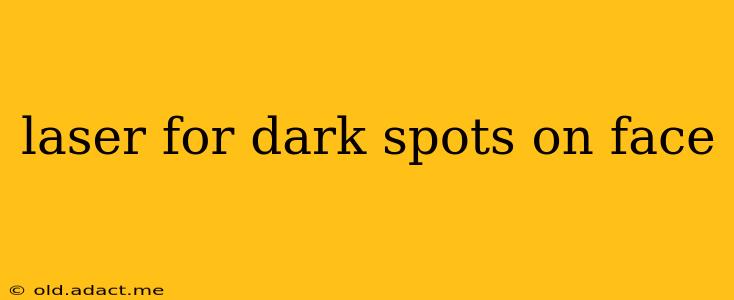Dark spots, also known as hyperpigmentation, are a common skin concern affecting many people. These blemishes can result from sun exposure, hormonal changes, acne, or injury. While various treatments exist, laser therapy has emerged as a popular and effective option for removing or significantly lightening dark spots on the face. This comprehensive guide will explore laser treatments, addressing common questions and concerns.
What are the different types of lasers used for dark spots?
Several laser types effectively target hyperpigmentation. The best choice depends on your skin type, the depth of the dark spots, and your doctor's assessment. Commonly used lasers include:
-
Q-switched Nd:YAG laser: This laser targets melanin, the pigment responsible for dark spots, breaking it down into smaller particles the body can absorb and eliminate. It's often used for treating darker skin tones effectively.
-
Q-switched ruby laser: Similar to the Nd:YAG laser, this option also targets melanin but is sometimes preferred for specific types of hyperpigmentation or skin tones.
-
Fraxel laser: This laser creates microscopic wounds in the skin, stimulating collagen production and skin renewal, thereby reducing the appearance of dark spots and improving skin texture. It’s a gentler option, often suitable for sensitive skin.
-
Intense Pulsed Light (IPL): While not strictly a laser, IPL uses a broad spectrum of light to target melanin, achieving similar results to lasers in some cases.
How many laser treatments are needed to see results?
The number of laser treatments required varies considerably depending on the individual, the severity of the hyperpigmentation, and the type of laser used. Some people see significant improvement after just one or two sessions, while others might require four or more treatments. Your dermatologist will create a personalized treatment plan based on your specific needs. Multiple sessions are often spaced several weeks apart to allow for healing and optimal results.
What are the side effects of laser treatment for dark spots?
While generally safe and effective, laser treatment can produce some side effects. These are usually temporary and include:
-
Redness and swelling: This is common immediately following the treatment and typically subsides within a few days.
-
Crusting or scabbing: Depending on the laser type and intensity, some crusting or scabbing may occur, eventually flaking off within a week or two.
-
Hypopigmentation (light spots): In rare cases, laser treatment might result in lighter spots where the dark spots used to be. This is usually temporary and resolves over time.
-
Hyperpigmentation (darker spots): This is another rare side effect, and your dermatologist will take precautions to minimize this risk.
It's crucial to follow your dermatologist's post-treatment care instructions meticulously to minimize potential side effects.
Is laser treatment for dark spots painful?
Most patients describe the sensation during laser treatment as a mild stinging or warming sensation. A topical anesthetic cream is often applied before treatment to further minimize any discomfort.
How much does laser treatment for dark spots cost?
The cost of laser treatment varies significantly based on several factors, including the type of laser used, the number of sessions required, the geographic location of the clinic, and the dermatologist's fees. It’s always best to consult with a dermatologist to get a personalized cost estimate.
What should I expect during a laser treatment for dark spots?
During a laser treatment session, your dermatologist will cleanse the treatment area. They may apply a topical anesthetic cream beforehand. The laser device will then be carefully passed over the affected area. The entire procedure typically lasts for a relatively short time, depending on the size of the area being treated.
How long does it take to recover from laser treatment for dark spots?
Recovery time depends on the type of laser used and the individual's skin response. Most people can resume their normal activities within a few days. Your dermatologist will provide specific aftercare instructions, often recommending the use of sunscreen with a high SPF to protect the treated area from sun damage.
Is laser treatment for dark spots safe for all skin types?
While laser treatment is generally safe, it is not suitable for all skin types and tones. Certain lasers are better suited to specific skin types. A thorough consultation with a qualified dermatologist is essential to assess your skin type and determine the safest and most effective treatment option for you. They will be able to determine if laser treatment is appropriate for you and discuss any potential risks.
This information is for educational purposes only and is not a substitute for professional medical advice. Always consult with a qualified dermatologist before undergoing any cosmetic procedure.
